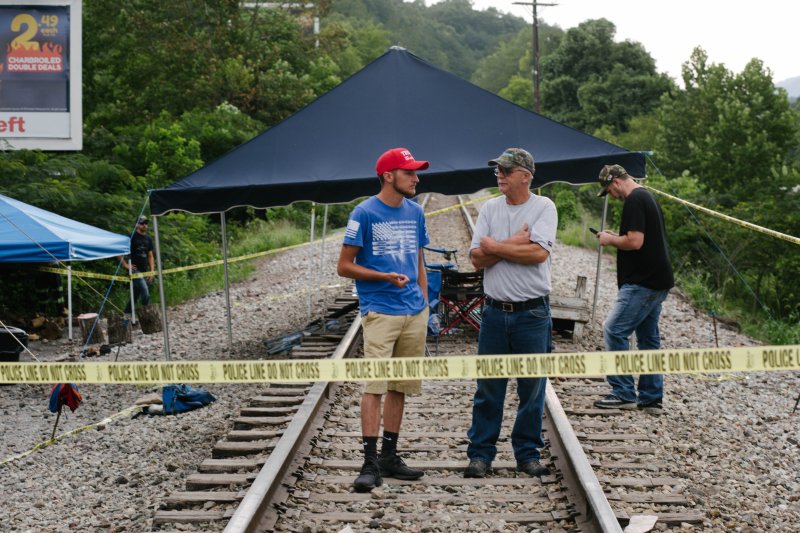
Miners stand on train tracks in Cumberland, Kentucky, U.S., on Friday, Aug. 2, 2019. The miners have been working in shifts to block railroad tracks leading to a Blackjewel mine outside since Monday afternoon, Harlan County Judge-Executive Dan Mosley said in an interview. They’re demanding back pay for work done in weeks leading up to the bankruptcy, after checks issued by Blackjewel bounced or never arrived. Photographer: Meg Roussos/Bloomberg via Getty Images

Share
Appalachia coal country has been the battleground for some of the most militant labor battles in this US history. Harlan County, Kentucky has a long history of coal miners striking for better conditions despite intense backlash from coal companies.
In 1921, 10,000 West Virginia coal miners seeking union recognition went to war with the mine operators who refused their right to organize. The dispute culminated in an armed five-day standoff in which strikebreakers and local, state, and federal authorities faced off with the miners This conflict became known as the Battle of Blair Mountain,, and the effect it had on the region’s strong culture of resistance continues. Miners and West Virginia striking teachers referenced those long-ago battles.
Coal miners continue their standoff against Blackjewel. Blackjewel declared bankruptcy and shuttered without warning in early July. The company owes each of the miners about $4,200 for back wages and unpaid benefits, lawyers representing the miners told the New York Times. It is estimated that Blackjewel owes $4.5 million in backpay to hundreds of workers. Blackjewel operated four mines in Appalachia, which employed more than a thousand workers. While Blackjewel hasn’t paid the miners, it did pay back $52.8 million in loans to the company’s CEO before declaring bankruptcy, according to the Wall Street Journal.
We done our protest peacefully, but in Harlan, Kentucky, we stand up for what we believe is right,” miner Chris Lewis, who helped start the protest, told NPR. “That’s been embedded in us from childhood up. You know, coal miners is brotherhoods. And we got a whole lot hanging in the balance here that we won’t back down.
Blackjewel employees say their last paychecks bounced, leaving many with negative bank accounts and no foreseeable options for paying bills and buying groceries.
According to Teen Vogue
The community and local churches have pitched in to help, and a collective of local trans anarchist activists are on the ground providing mutual aid, but many miners are still struggling. The Blackjewel mine was reportedly not unionized, but its former workers have used the tried-and-true union tactic of collective action to fight for what they are owed.
In early August, Working People podcast spoke with Josh Holbrook, “one of the Kentucky coal miners currently protesting coal companies Black Jewel, Black Hawk, and Revelation for stiffing him and his coworkers on backpay after going bankrupt.”
Southern non-profit community driven newsroom Scalawag sent Filmmakers Shaylan Clark and Oakley Fugate profiled protesting miners. Their focus was on the impact on their families and communities.
“Bringing you more than a soundbyte, their short documentary powerfully centers miners voices, enabling those outside the region to bear witness. Clark and Fugate are alumni of the Appalachian Media Institute, which trains youth from across Central Appalachia to explore their home communities and address local issues through place-based media-making.”
Friday, Democratic presidential candidate Senator Bernie Sanders and sent 18 pies from a local Pizza hut for each day they’ve been blocking the Blackjewel train, according to the local NBC affiliate

